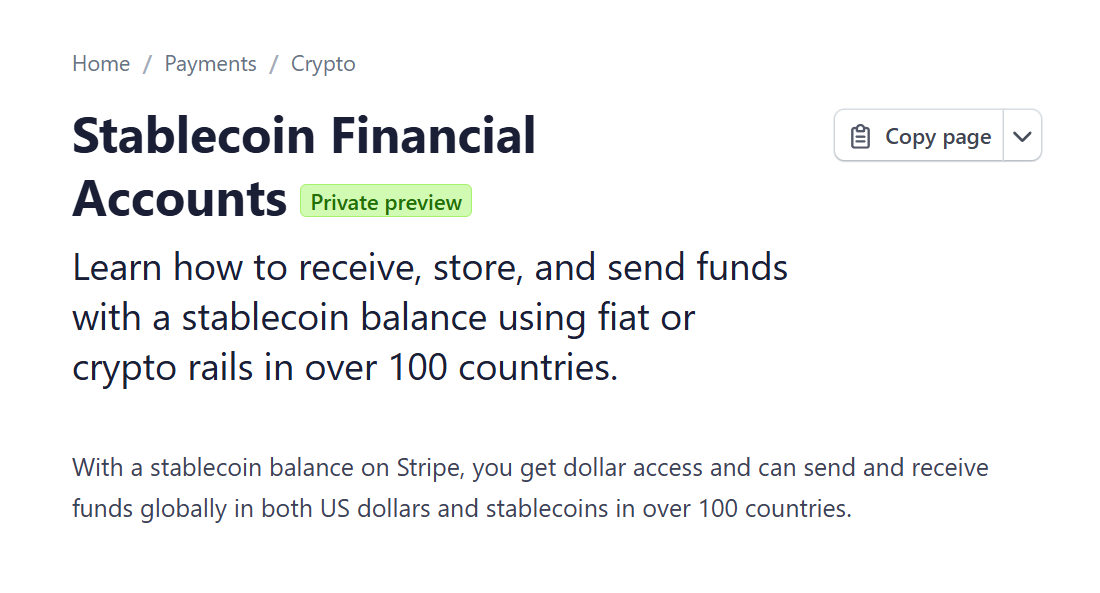2025-05-08

Stripe has launched stablecoin-funded
accounts in more than 100 countries, marking a major expansion of its global
payment capabilities and a strategic move into the growing world of
crypto-backed finance.
Announced on May 7, the new feature allows businesses to send, receive, and hold stablecoin balances, similar to a traditional bank account, using Circle’s USDC and Bridge’s USDB.

docs.stripe.com/crypto/stablecoin-financial-accounts
Stripe acquired the stablecoin
infrastructure platform Bridge in October 2024 for $1.1 billion, marking the
largest acquisition in Stripe's history. The deal was finalized in February
2025.
Bridge, founded in 2022 by Zach Abrams
and Sean Yu, offers APIs that enable businesses to issue, accept, and transfer
stablecoins like USDC, USDT, and DAI. Its platform simplifies cross-border
payments and allows developers to integrate stablecoin functionality with
minimal code.
The launch is timed with a surge in
global interest in stablecoins, whose total market capitalization has now
surpassed $231 billion.
The accounts will be available in
countries facing economic instability such as Argentina, Turkey, and Colombia,
where stablecoins are increasingly being used as a hedge against inflation and
unreliable banking infrastructure.
Stripe’s offering is built to operate
on both fiat and crypto rails, enabling businesses to bypass local currency
volatility and slow legacy systems.
“Now users in Argentina, Vietnam and
everywhere in between can hold stablecoins, receive and send funds on both
crypto and fiat rails,” said William Gaybrick, Stripe’s president of product
and business, during the company’s annual conference in San Francisco.
The stablecoin accounts are the result
of Stripe’s October 2024 acquisition of Bridge, a $1.1 billion deal aimed at
integrating stablecoin orchestration into its platform. This infrastructure not
only supports crypto payments but also enables real-time currency conversion
and rapid settlement across borders.
The new accounts are part of Stripe’s
broader shift from a payments facilitator to a full-fledged financial
ecosystem. Stripe now lets companies store balances in multiple
currencies—including US dollars, euros, and British pounds—and use those
balances to pay global vendors or partners.
John Collison, Stripe’s co-founder and
president, emphasized the need for change: “We should be very dissatisfied with
the state of financial services today… This is a new product but it’s an
opportunity for us over time to deliver much more safety.”
Early adopters like corporate card
startup Ramp are already integrating Stripe’s stablecoin infrastructure to
offer faster, cheaper, and more secure financial services.
Ramp plans to launch stablecoin-backed
corporate cards with instant settlement and automatic currency conversion
through Stripe’s Bridge and Visa.
Alongside its stablecoin expansion,
Stripe also unveiled an AI development tool that allows businesses to embed
autonomous shopping agents into their platforms.
Stripe will also serve as the exclusive
payments partner for Visa’s AI-powered transaction agents.
“These are the twin revolutions in
intelligence and money,” Gaybrick said. “Stablecoins are the first truly
global, fully programmable money—and AI is changing how we interact with it.”
With stablecoins increasingly seen as a
bridge to financial inclusion and efficiency, Stripe’s move signals a major
evolution in how digital money and modern commerce will intersect.